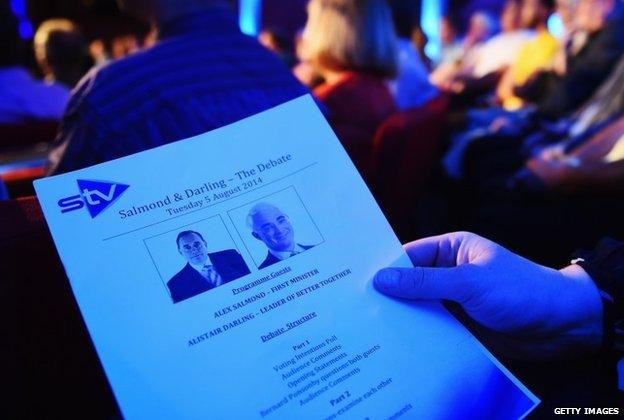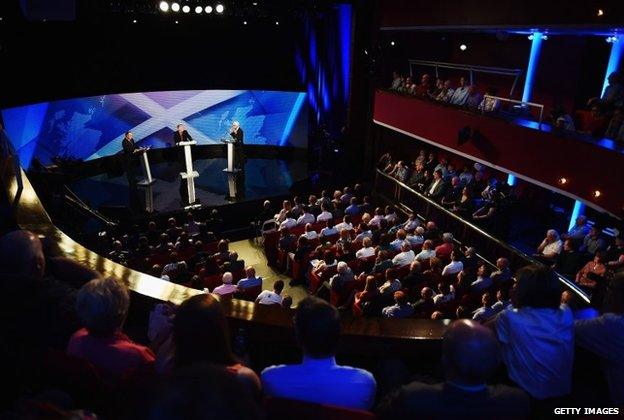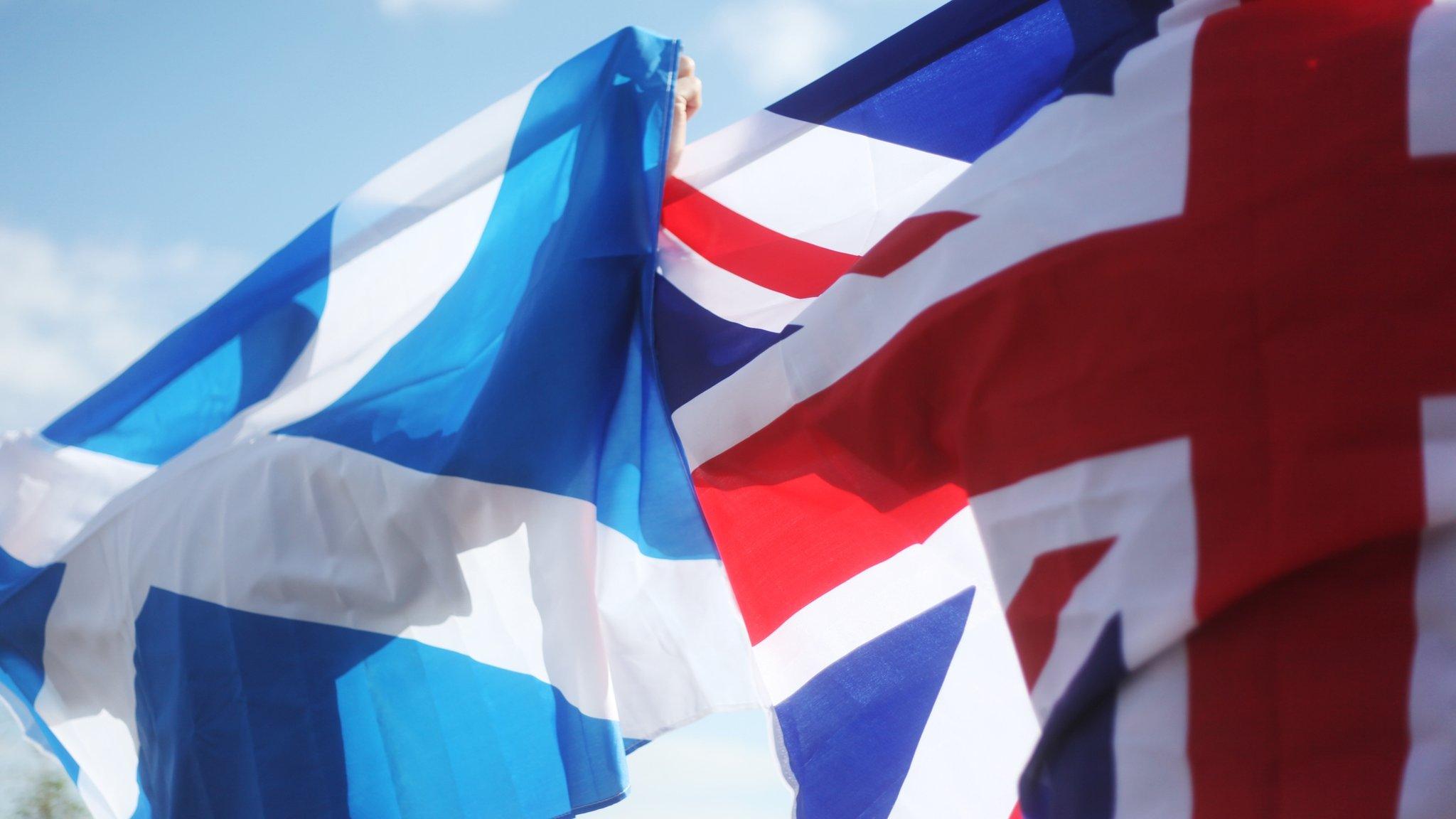Scottish independence: Salmond and Darling clash in TV debate
- Published
- comments
Alistair Darling: "If you don't get a currency union what is it we're going to have instead?"
Alex Salmond and Alistair Darling have clashed in a TV debate ahead of the Scottish independence referendum.
Scotland's first minister said the nation was being run by Westminster parties it did not vote for.
Mr Darling, leader of the pro-Union Better Together campaign, said independence campaigners had failed to answer key questions.
The STV debate, from the Royal Conservatoire of Scotland, in Glasgow, came ahead of the 18 September vote.
Alex Salmond: "No one will do a better job of running Scotland than the people who live and work in Scotland"
Alistair Darling MP: ''No thanks to the risk of independence''
Mr Salmond told the 350-strong studio audience that very few people disputed Scotland could be a successful, independent country.
He said 49 of the 71 countries which took part in the Glasgow Commonwealth Games were the same size or smaller than Scotland, yet thousands of children with families were reliant on food banks, while the UK government was spending an "obscene" amount of money on nuclear weapons, based on the Clyde.
"For more than half of my life, Scotland has been governed by parties the we didn't elect at Westminster - and these parties have given us everything from the poll tax to the bedroom tax, and they are the same people who, through 'Project Fear' are telling us that this country can't run our own affairs," said Mr Salmond.
"My case this evening is simple - no one, absolutely no one will do a better job of running Scotland than the people who live and work in Scotland.
"On 18 September, we have the opportunity of a lifetime - we should seize it with both hands."

Analysis

By Colin Blane, BBC Scotland correspondent
This was a lively, sometimes ill-tempered verbal contest with the two politicians remaining in entrenched positions.
Alex Salmond opened by saying an independent Scotland would place a much greater emphasis on social justice.
Alistair Darling insisted that by remaining in the UK, voters in Scotland could have the best of both worlds.
There were noisy exchanges. Alistair Darling pressed Alex Salmond repeatedly about which currency he would use if the rest of the UK refused to enter a currency union.
For his part, Alex Salmond urged Mr Darling to accept that Scotland could be a prosperous independent country. Again and again he asked him to say if he agreed.
The audience showed its irritation on occasions when the two men seemed to be dodging questions. It remains to be seen who will be judged the winner.

'Blind faith'
Alex Salmond and Alistair Darling disagreed on whether the political status quo was democratic or not
Mr Darling said the referendum was about Scotland's future, not patriotism.
"There are times that, for the love of our family and the love of our country, it's sometimes best to say 'No' - not because we can't, but simply because it is not the best thing to do," he said.
"In six weeks' time, we will make the biggest decision that we've ever made here in Scotland - and remember this, if we decide to leave, there is no going back - there's no second chance."
The Scottish Labour MP said a referendum "No" vote was not a vote for no change, and hitting out at Mr Salmond, the former UK chancellor said: "We cannot make this decision on the basis of guesswork, fingers crossed or his blind faith."
"Let's say with confidence, let's say with pride, let's say with optimism, 'no thanks' to the risks of independence and let's say 'let's have the best of both worlds, not just for us but for generations to come."

Debate fact check

By Anthony Reuben, head of statistics, political analyst Emily Craig and data journalist Marc Ellison
In the TV debate "spin room", Deputy Scottish First Minister Nicola Sturgeon said Scotland was one of the wealthiest countries in the world. This claim is about GDP per head (that's the total amount of goods and services produced by the economy divided by the population). The current rankings, external of GDP per head among OECD countries puts the UK is in 18th place and the "Yes" campaign reckons an independent Scotland would be in 14th place
Alistair Darling said the working age population was falling faster in Scotland than the rest of the UK. That is confirmed in this report, external from the UK Statistics Authority, which says: "The dependency ratio in respect of elderly people is projected to increase faster than for the UK"
Alex Salmond said Scotland had contributed £8bn to UK finances. According to Scottish government figures, external, Scotland has contributed more to the Treasury per head than the UK average, if you assume a geographic share of North Sea revenues. In 2011-12, it was £1,500 more per head (the figure Mr Salmond quoted) and, if you multiply that by the Scottish population, you come to £8bn
Alistair Darling said that, for the last 22 years, Scotland had spent more than it has collected in tax. This is supported by Scottish government statistics, external with the exception of 2000-01, when there was a £2.1bn surplus. The figure is based on dividing North Sea oil on a geographic basis

The two rivals clashed on a range of other issues during the two-hour programme, including:
Mr Darling said Scotland would get "substantial" new powers if it stayed in Union. Mr Salmond said SNP MPs would "vote for more powers" in the event of a "No" vote, but insisted: "We're anticipating a 'Yes' vote."
Mr Salmond said an independent Scotland could keep Sterling, insisting: "It is our pound as well as England's pound." Mr Darling said leaving the UK but keeping the pound was "a bit like getting a divorce and keeping the same joint bank account".
Mr Darling said there was a question mark over how long it would take an independent Scotland to become an EU member. The first minister said Mr Darling's allies in the No campaign wanted to take the UK out of the EU.
On finance, Mr Darling, said: "In the last 22 years Scotland has spent more than it has put in, so we have benefited from being part of the United Kingdom. Mr Salmond argued: "In each one of the last 33 years, Scotland has paid more in tax per person than the average of the UK."
Following the debate, Blair Jenkins, head of the Yes Scotland campaign for independence, said: "This was a clear win for the 'Yes' campaign - a positive, optimistic and visionary case presented by the first minister, against another dose of negativity and scaremongering from Mr Darling.
Better Together campaign director Blair McDougall, added: "The nationalists had arrogantly said this would be 'Salmond's Bannockburn'. It may yet turn out to have been his Waterloo."
Meanwhile, it is understood there were technical issues with the STV player during the debate, which allowed viewers to watch the debate online.
The BBC had asked for permission to stream the debate live online and use it on other platforms, but the request was declined by STV.
A second debate is to take place on the BBC later this month.
- Published5 August 2014
- Published5 August 2014
